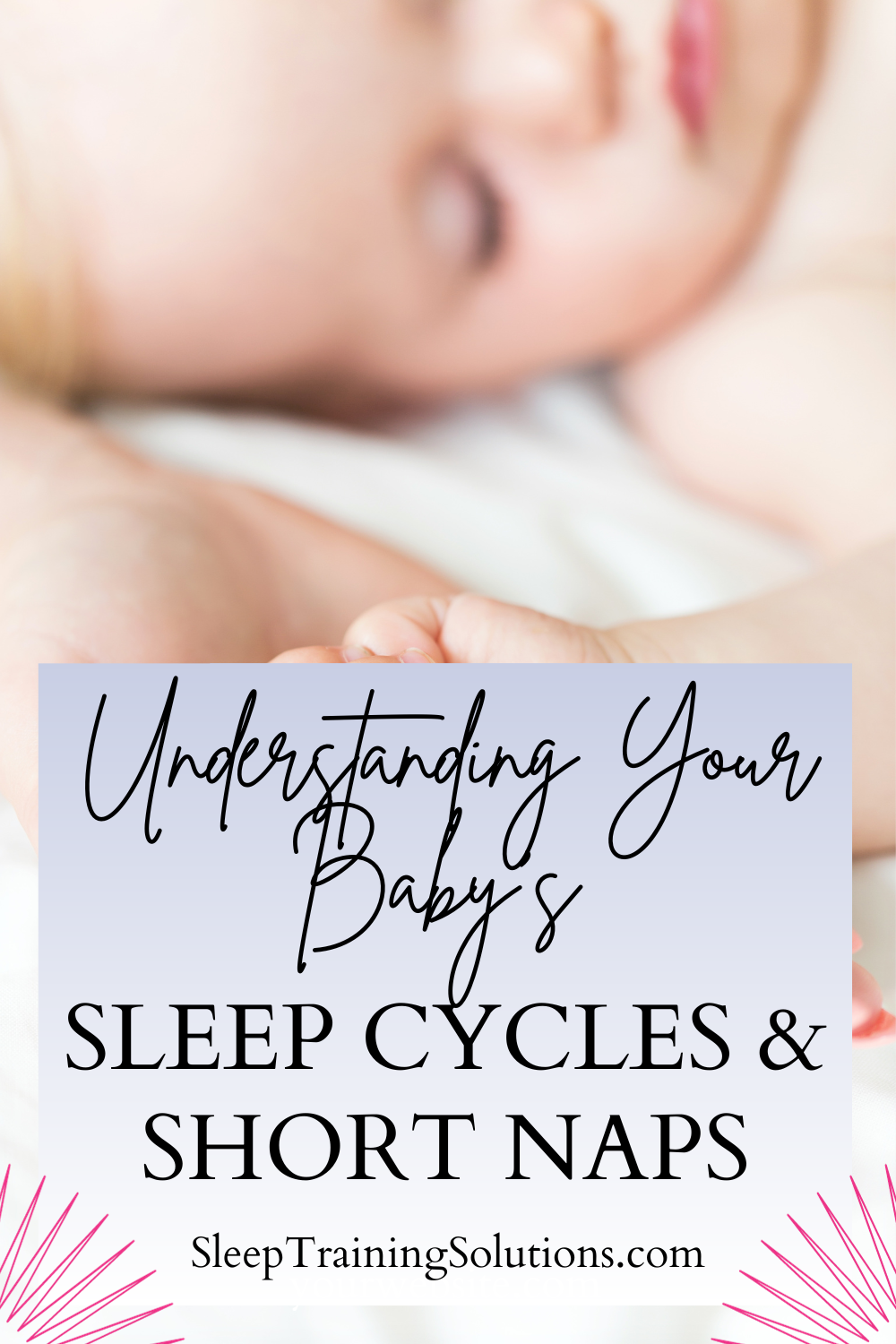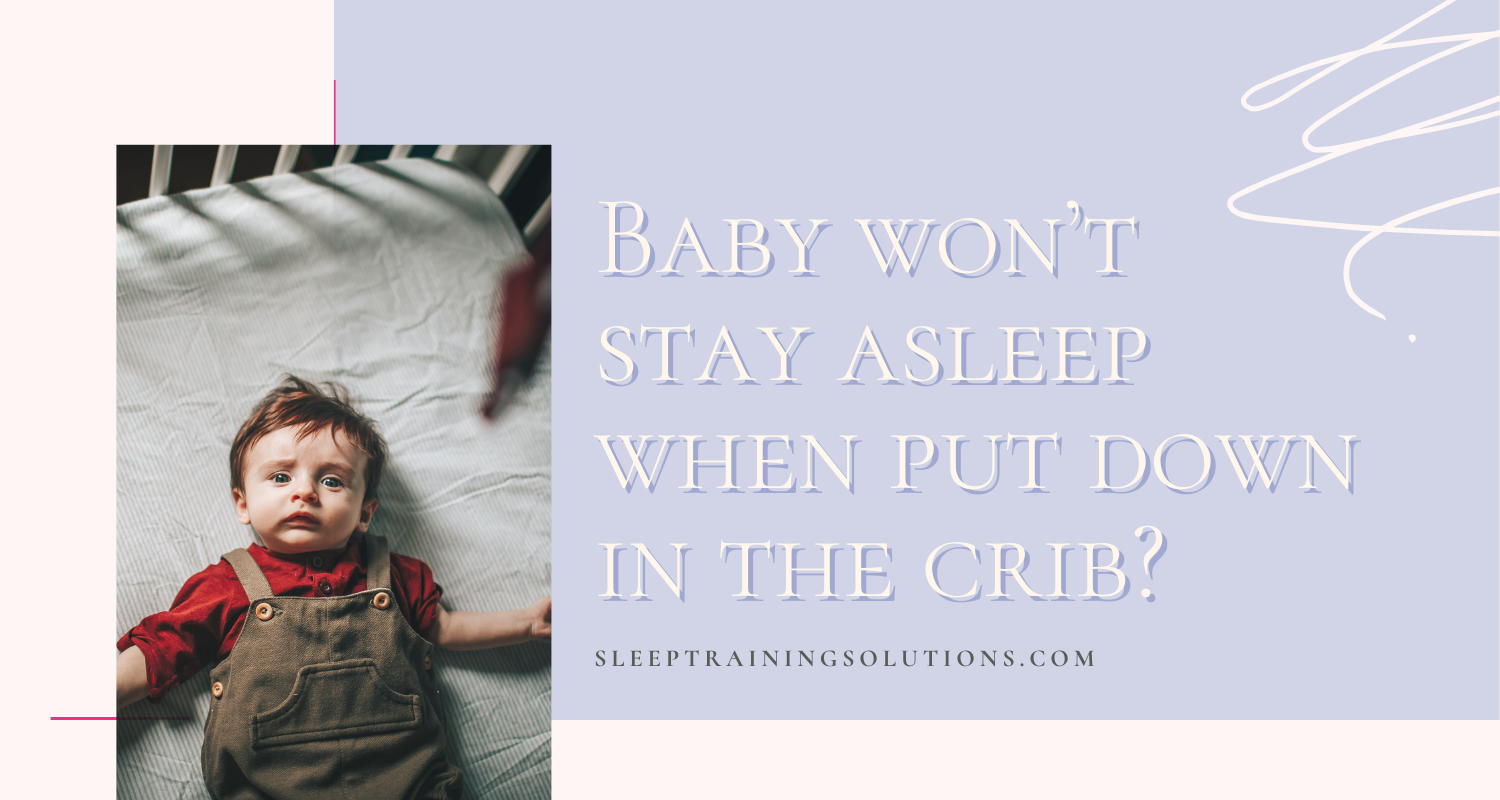Understanding sleep cycles and short naps for babies
Does your baby have short naps, waking up 20 or 30 minutes into the nap? Or maybe your baby wakes up at 40 minutes on the dot? This post will help you understand your baby’s daytime sleep cycles and show what you need to do to lengthen those naps for babies 4 months and older!
Daytime nap sleep cycles for babies
In the first 10 minutes of the nap, your baby is in light sleep. In this stage of sleep, your baby can easily startle or be woken up by a shift in position (for example, if your baby fell asleep in your arms and you attempted to lay her down on a flat surface like the crib) or a sudden or loud noise (like a dog barking next door).
For the next 10-20 minutes, your baby is in deep sleep. When babies are in this deeper state of sleep, they’re very still, their breathing becomes very regular and they’re much harder to wake up.
Between minutes 30-40, your baby is coming out of that deeper sleep, and by 40-45 minutes, that sleep cycle ends.
Why does my baby wake up after 20 minutes?
Looking at the explanation of the daytime nap sleep cycles above, at the 20-minute mark, your baby is in deeper sleep.
If your baby is waking up after 20 minutes while in that deep sleep, there’s typically a reason like hunger, a dirty diaper, or discomfort.
If this is happening regularly, try to keep a feed log to make sure your baby is getting the right amount of ounces per feed and per day, and to help make sure that the next feed won’t land in the middle of a nap.
If you notice your baby waking with a dirty diaper, check out What to do when pooping affects your child’s sleep!
Babies who wake from discomfort will continue to have that discomfort after you pick them up (unless it’s related to reflux or a gas bubble or burp that needed to come out). Always consult with your pediatrician if there’s a issue that you’re concerned about.
Why does my baby wake up after 30 minutes?
At the 30-minute mark, your baby is just coming out of deep sleep, but there are still 10-15 minutes left in that sleep cycle and she shouldn’t be waking up yet!
If your baby is waking at that time, it’s often due to overtiredness or not being tired enough before that nap.
Overtiredness will make falling asleep - and staying asleep for the right amount of time - much harder. So an overtired baby will often have a shorter nap and wake up after being in deeper sleep.
An “undertired” baby will wake up from a nap too soon simply because she wasn’t tired enough to sleep for a full nap.
There are so many pieces to successfully sleep training - Download your free PDF and get weekly sleep tips to help set you up for success!
Why does my baby wake up after 40-45 minutes?
Does your baby fully wake up at the end of the sleep cycle instead of being able to drift easily into the next sleep cycle? The reason this is happening is because your baby doesn’t have strong sleep skills.
If you’re rocking or feeding your baby to drowsy or asleep for naps, when she wakes up at the end of the sleep cycle, she’ll be looking for you to recreate how she initially fell asleep for that nap, instead of being able to get into the next sleep cycle easily on her own.
If this is happening, it’s time to stop using sleep props to get your baby to sleep! No more rocking or feeding, no pacifiers, or motion (like stroller, car or swing). It’s time to teach your baby how to do it on her own, and if she’s 4 months or older, she can!
If you need help with this, check out my baby sleep course or you can schedule a discovery call with me.
How long should your baby be napping?
I always tell my clients that we’re aiming for most naps to be over an hour. That shows that your baby can get into the next sleep cycle independently which is the biggest part of lengthening short naps.
Number of naps and total amount of sleep by age:
4 months: 4 naps per day - 4 hours of total nap sleep
5 months: 3 naps per day - 3.5 hours of nap sleep
6/7-12/13 months: 2 naps per day - 3 hours of nap sleep
Many children will transition to one nap between 12-14 months and that nap will be 1.5-2.5 hours.
The length of the naps will vary. Typically the naps at the beginning of the day are longer than the later naps. Babies aren’t robots, so they often will have different length naps to reach the allotted amount for the day. It’s common for the last nap of the day to be shorter because the nap allotment has been filled for the day and there’s only 30 minutes left (for example a 4-month-old that slept for 3.5 hours with the first three naps will only have 30 minutes left for nap #4).
You’ll know your baby got enough sleep when she wakes up happy and is close to the amounts of nap sleep above :)
Related Posts:
This post is for informational purposes only and may not be the best fit for you, your child and/or your personal situation. It shall not be construed as medical advice. The information and education provided here is not intended or implied to supplement or replace professional medical treatment, advice, and/or diagnosis. Always check with your child’s physician or medical professional before trying or implementing any information read here.






